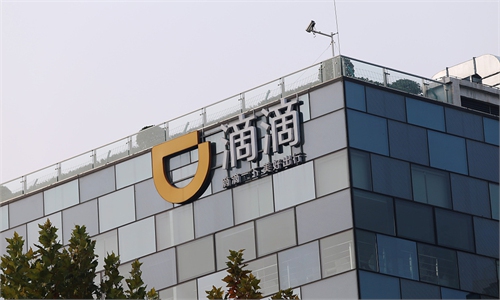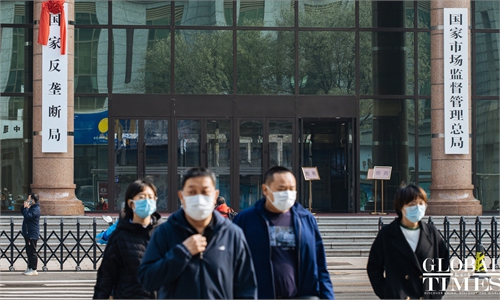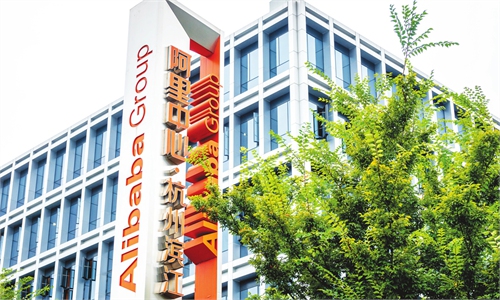China sends strongest signal to support platform firms as Premier Li meets with industry representatives
Pledges on private sector not ‘lip service’ but concrete actions: analysts

A staff member presents glasswork via livestreaming at a company in Hejian City, north China's Hebei Province, Feb. 11, 2023. Hejian City is famous for its glasswork making industry. Now, there are more than 200 glasswork making companies and over 60,000 staff members involved in the industry in Hejian. The annual output of the glasswork reached nearly 10 billion yuan (about 1.47 billion U.S. dollars) and the glasswork has been exported to over 50 countries and regions. Photo: Xinhua
Chinese Premier Li Qiang said that China's platform economy has provided new space for expanding demand, a new engine for innovative development, new channels for entrepreneurship and recruitment, and new support for public services, which has had a growing and prominent role in the development landscape.
Li made the remarks while presiding over a meeting with representatives from platform operators including Alibaba, Douyin, Xiaohongshu and Meituan on Wednesday, where representatives from the operators made in-person speeches or handed in written statements, China Media Group reported.
Li said he hoped the platform enterprises would continuously promote innovative development and breakthroughs, and better empower the development of the real economy, while actively fulfilling their social responsibilities and increasing international competitiveness.
He called on relevant authorities at all levels to create a fair and competitive market environment, along with improved policies, and establish a sound, transparent and predictable regulatory system for normalized regulation.
Li also called for lowering the legal operational costs for enterprises and promoting a sound business development while establishing and improving a communication mechanism with enterprises, aiming to further promote the standardized, healthy and sustainable development of the platform economy.
China's platform economy is investing more in high-tech innovation and other areas that could empower the development of the real economy, a survey conducted by the National Development and Reform Commission (NDRC), the country's top economic planner, showed on Wednesday.
The NDRC vowed further support for platform operators to play a more active role in driving the economic recovery, creating more jobs and growing stronger in international competition.
The NDRC's endorsement could inject confidence into platform firms and the whole private sector, stabilizing market expectations as they can feel the central government's resolve to recover its COVID-hit economy, experts told the Global Times.
In the first quarter, China's top 10 platform operators, in terms of market capitalization, saw a 15.6 percent quarter-on-quarter increase in investment in chip technology, autonomous driving, new energy and agriculture.
From 2020 to 2022, the 10 companies invested a total of over 500 billion yuan ($69.7 billion) in research and development (R&D), with an average annual growth rate of 15 percent. They also obtained more than 50,000 patents, establishing themselves as a key force in digital technology innovation, the NDRC survey found.
Chinese tech giants Alibaba, Tencent and Meituan are among the praised names.
For example, Tencent has ramped up investment in Enflame Technology, a Chinese artificial intelligence (AI) chip start-up, which will promote the development of domestic high-performance AI chips.
Separately, Alibaba's investment in supporting the transformation and development of agriculture and services has helped more than 500 villages and towns to realize digital upgrades, which facilitated nearly 1,000 agricultural products being shipped out of villages into cities, contributing to the common prosperity of urban and rural areas, the survey read.
"Their investments have not only generated substantial returns and enhanced the competitiveness of platform enterprises but also driven high-level technological self-reliance, improved the efficiency of the real economy, and contributed to the construction of a modern industrial system and high-quality development," the NDRC said on its official WeChat account.
The NDRC endorsement came as China ended an investigation that lasted more than two years into the platform economy with a final penalty of 7.12 billion yuan on Ant Group, the financial arm of Alibaba, which was announced on Friday.
Since November 2020, financial regulators including the People's Bank of China, the country's central bank, and the China Securities Regulatory Commission have guided and supervised 14 large-scale platform companies, including Ant, to carry out rectification on prominent issues associated with their financial businesses, such as operating without a license, regulatory arbitrage, blind expansion and infringing on consumers' rights.
The end of rectification shored up Alibaba's shares on that day, while sending a strong signal that China's platform economy will revive its growth under normalized regulation, fueling market expectations that China's economic recovery is making headway steadily, industry observers said.
Pan Helin, joint director of the Research Center for Digital Economics and Financial Innovation affiliated with Zhejiang University's International Business School, told the Global Times on Wednesday that China's top policymakers have always attached great importance to platform operators, hoping for their robust growth and contribution to the country's modernization.
"Thus, they shouldn't focus just on making profits, but instead more thought and actions on helping the real economy are needed. There's plenty of room for platform operators to give full play to their value," Pan noted.
As a key force to drive the real economy, the size of the platform economy is estimated to reach 100 trillion yuan in 2030, a Deloitte report showed previously.
"Platform operators, especially the big ones, represent the future of the digital economy, based on their enormous investment on technology innovation. They are the forerunners in the global high-tech race," Song Ding, a research fellow at the China Development Institute, told the Global Times on Wednesday.
Song refuted hype by Western media on China's support for the private sector, as they claim it is more "sweet talk" and "lip service" instead of following through on the pledges.
"Actually, we can see, from the central government down to multiple localities, concrete measures have been continuously rolled out," he noted.
For instance, the local government in Southwest China's Sichuan Province recently launched a package of 10 measures to support private firms in financing, lowering costs in industrial production and enhancing subsidies for R&D investment.
Heads of several central government bodies have presided over at least six meetings with multiple private enterprises in the first 10 days of July to address companies' concerns. The NDRC held two such meetings within seven days.




